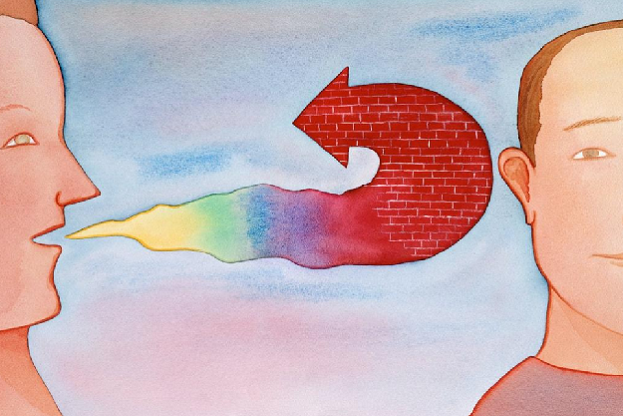How to Give Feedback
Let's talk about the most important "f-word" in education: Feedback.
For example, Mozart has usually been represented as a wunderkind - a complete natural, genius. And although he was a historical example of a child prodigy, he didn't do it on his own. You see, his father was a world-class teacher and musician in his own right. Which means junior was receiving the best education 24 hours a day. And this explains why children can grow up speaking their parents' native tongue without even learning it in school (constant feedback). So today, let's look at:
How Not to Give FeedbackFeedback determines everything. You can be the greatest pianist in the world but if you're not able to give reliable feedback, you're just an artist and not a teacher. Without clear, objective instructions, students won't make any progress. I'm sure you know the feeling well. Think about jobs where they just threw you in with a sink-or-swim approach or teachers who got angry at you because you didn't understand their (confusing) directions. More examples:
And educators will continue making these mistakes until they understand the types of feedback that exist. The Right Way to Give Feedback
According to the book Ultralearning by Scott Young, there are 3 kinds. Outcome feedback is the most available. It's a little better than nothing - because it doesn't really tell you how you're doing or what you're missing. School grades are one example. Does getting an A mean you understand the material? It might mean you're just good at memorizing (or you cheated). Does a D make you a bad student? Maybe you just process the material at a slower (and deeper) level or perhaps the teacher just isn't good. Next, information feedback tells you what you're doing wrong, but not how to fix it. I experienced this on a trip to Barcelona. I made it a point - when I wasn't too shy - to practice the Spanish I'd been studying. Sometimes people would flash a smile of understanding, most times I'd get faces of confusion. Now ... onto the very best form of feedback. Best of The BestCorrective feedback is the crème de la crème. This tells you what you're doing wrong and how to fix it - like a doctor who figures out why you're sick and gives you the correct medicine. This is the biggest reason you should be working with an instructor, because any self directed feedback has a high chance of being unreliable. Though many teachers are biased (everyone's human), at least they're going to have more experience and knowledge than you - a bad teacher is better than no teacher. And when you get better at piano, you can always ditch them and find a better one. Bonus tip: Make sure the feedback you give, or receive, is as immediate as possible. This is the first thing I learned when training my dog. Whatever behavior you're rewarding, you have to give them a treat within a few seconds or they will forget (it's the same for people). This is also what makes piano competition or jury comments useless - you get them almost a week (or more) later when you've forgotten nearly everything about that performance. MethodsNow in terms of corrective feedback, I'm going to share with you the two most useful methods that I use. With verbal or written instructions, you want the student to have a crystal-clear understanding on what to do and how to do it. How do you do this? You check for comprehension. I basically ask them to summarize my instructions ... in their own words. If you don't ask them to do this, they'll just parrot your exact words back to you (thank you public school system). What's trickier is that even if they do this correctly, they still might not get it. For example, I remember the following scenario: Me: Understand what I said? Student: Yes, you asked to (blah blah blah, summary in his own words) M: You sure about that? S: Nods his head M: Are you just saying yes because you're trying to be a good student? S: Nods again So be aware that you may have to dig deeper. Now in terms of actual piano playing, demonstration is the most concrete, objective form of feedback. As a side note, I see many teachers do anything but demonstrate or even ask the student to play. They're like bloated windbags who over-explain and are more interested in the sound of their own voice than helping the student. Rant over (thanks for obliging me). So here's what I do:
When necessary, I will demonstrate (play) how a particular passage sounds. Then I ask them to play it back. And the final step is to play it together (simultaneously). Now if you want to speed up their progress, do more simultaneous playing. However, if you want to improve their comprehension, go back and forth between the first 2 steps more than a few times - or even ask them to play the passage before you demonstrate. Think of it as a camera "focusing." They're not going to nail it after one demonstration - each attempt is the picture becoming "clearer." And to further enhance their understanding, I might not even say anything. I'll just play it again without providing any tips or assistance. Of course if they're having a really difficult time, I'll gladly add in some instructions - such as move your hand to this position when you get to this passage, etc. However, the ultimate goal is for them to understand in the fewest tries possible. This skill is super useful since they'll be on their own (home practice) most of the time. The more they accurately demonstrate what I've played at their lessons, the higher chance of them replicating it at home. ToolsBesides giving effective feedback at the lesson, it's just as important to give them the proper tools to succeed at home (since lessons are only once a week). TrackingThe first one is a journal (instruction booklet) with a checklist that needs to be completed every day. Each checklist item can be whatever you want, such as:
For more advanced students, you can even use the checklist as a scoring system. For example, I can have them pick a number (1-10) for use of proper dynamics, articulation, or how often they used a metronome. Once we have that number, we can work together to slowly increase it. This helps them critically analyze their practice instead of just playing on autopilot. By the way, having an awesome reward system does a lot to motivate them to get their points for that week. VideosNow my most important resource is the library of videos I've recorded for all of their music (pick up a free copy here). Why? Because the tape doesn't lie. As previously mentioned, if you've demonstrated what to practice at the lesson - and if the student can successfully play it back - then the videos become the most accurate, concrete example of feedback they can use (at home). Videos hit all of the senses necessary for piano playing: listening (melody, harmony), physical (rhythm) and visual (which keys). They know exactly what to play, when to play, and how to play it. If they continue to use the videos diligently, many times they'll even show up to the lesson having learned more than what was taught the previous week. Sometimes they'll even learn new pieces entirely on their own! When NOT to Use FeedbackNow there are also times you shouldn't use feedback. For example, not all lessons will be consistent. In statistics, there's a term known as regression to the mean. Basically, it means whether you've had a great or terrible lesson, the next one will be closer to the average. Which means your feedback isn't always directly responsible for your student's results. And sometimes they've had a bad lesson because they've had a tough week (school or life), so make sure you know what's going on in their personal lives outside of piano. Lastly, giving feedback is like a balancing act. As Scott Young says, "Being too successful is as damaging as failing too much." The more you teach, the more you'll experience a mixture of wins and losses. To be human is to be inconsistent, so embrace every success and failure that comes your way. Happy practicing!
Did you enjoy reading this today?
Your donation helps me create free content. Every dollar goes a long way! =)
0 Comments
What Successful Teachers Do
Think back to the last time you were in class, or in a piano lesson, and you felt this void between yourself and the instructor.
If you really, I mean really, struggled in that class no matter how much effort you put into it, did you ever wonder why you just couldn't "buy in" to what he or she was saying? And let's say this is on top of the class being very interesting to you! I believe this is the #1 thing that many teachers forget to do that ultimately sets themselves up for failure. Teachers can sometimes get too excited and caught up with the material. Sometimes they're just there to make sure the student "absorbs" all the information. But they never consider the fact that they forgot to MAKE A CONNECTION. The most powerful motivator for people is feeling valued as a human being. If you're a parent, make sure your kid feels appreciated. If you're at your job, make each and every customer feel special. If you're a boss, develop meaningful relationships with your employees. Even though I love my parents to death and am extremely grateful for how they raised me and provided for the family, I always longed for those words of praise and encouragement instead of having to do something to "be a good student" or "be a good son." It's something I take to heart and have made the #1 priority in my studio. Before they play a single key on the piano, and before you teach them anything music-related, make the student feel important no matter what. If you're struggling to get your message across, remember to first value your student, child, brother, mother, employee, boss or friend. They'll thank you for it.
Did you enjoy reading this today?
More from Rhapsody Piano Studio…..
Your donation helps me create free content. Every dollar goes a long way! =)

I’m going to share with you a BIG secret that helps me to be a better teacher.
Over the years I’ve read, researched and put into action many, many things that have improved my teaching. But I’ve found there’s one simple thing anyone can do to make an immediate improvement to become a better teacher Ask. That’s it. The science of effective teaching at its basic core is this simple action. But you also have to ask the right way. Let’s look at why. Where does a kid spend most of their day? Drumroll please… That’s right, school. As much as school can teach kids about working with other individuals, operating respectfully in a system of hierarchy and having basic social skills, I’m not a big fan of a lot that goes on in the classroom environment. To be more specific, I think it’s unhealthy how children get conditioned to do things a certain way. Here’s the situation: imagine you’re back in school and get asked a question in front of the ENTIRE class by your teacher. Spotlight’s on you buddy. Let’s say most of the time it’s an answer you know, but you feel the added pressure from the eyeballs of your classmates staring directly at you and your mind draws a blank. What would you do? Would you tell the teacher, “I can usually answer this question but with the added social pressure and attention on me at the moment I’m feeling very uncomfortable and unable to answer.” Or will you say… “I don’t know.” Yeah, that’s what I thought. “I don’t know” is effective because it’s a get-out-of-jail card that works every single time. So the student uses it again, and again, and again until it’s conditioned into a habit. Because think about it, what is the teacher going to do? Accuse them of lying?? By the way, I use a simple fix for the dreaded “I don’t know.” I simply tell all my students that it’s a phrase they aren’t allowed to utter in piano lessons ever. EVER! But you have to understand that this is not the student’s fault. In their mind they’re trying to respect their fellow students and teachers by not wasting time. Would you be comfortable standing there in complete silence for 3-5 minutes while trying to come up with an answer? In front of everyone?? At that age, that type of silence is deafening and minutes can feel like hours. Plus, most teachers don’t have the patience to wait in the first place. And this is only half of the dilemma. The other half is that I personally believe many educators are terrible at getting honest, useful feedback from their students, especially in a group environment. If you’ve had the same experiences I did in college, you eventually found out that instruction isn’t necessarily better in a higher education system. The college classroom isn’t exactly the epitome of freedom of expression. Unless, hurray for you, you went to a great school with great professors.
One of the worst scenes (of many) I can remember was when I was still in a music doctoral program.
One day, the professor asked for the class’s opinions and a student bravely volunteered (it can be scary to put yourself out there) and expressed her point of view. You could tell how nervous she was by her tone of voice. So what did this professor do? Well, she wasn’t rude about it but she basically told the student that she was flat-out wrong in front of everyone! Personally, I felt terrible for this student and I was horrified at how ignorant an “intelligent” professor could be. Congratulations! You just guaranteed that no one will want to speak up in your class ever again. Is that the only reason why no one else was eager to speak up? Nope. Turns out 90% of the time none of my classmates had a clue to what this professor was talking about. I know, because I would ask my colleagues after each class was over. I was just as desperate as they were to understand the material. But wait, the story didn’t end there. This same teacher later complained about a lack of student involvement! Administer self *head slap*. What Makes A Good TeacherSo how do we not repeat this horrific experience and get honest, truthful feedback from the student? Well besides doing my best to stay humble and admitting that I don’t always have the right answer, I also try to think of why I’m asking in the first place. Is it to get honest feedback? Is it to help the student? I have to ask these questions sometimes because I’m far from perfect. In my lowest moments I can have the urge to do something petty to get the point across (we’re all like that sometimes, admit it). Knowing the why almost always snaps me out of it. I want to know if they truly understand what I’m saying. And what’s important is that you have to create the space where they feel like they will not suffer ANY negative consequences whatsoever for their words. You have to make it 100% safe that they will not be judged, that they can trust you. What’s more important is how you make them FEEL. You have to realize that some kids aren’t able to communicate effectively yet and you have to be willing to not take ANYTHING personally. Because trust me, sometimes the answers will sting you. Side Note: Have you ever met adults that rub people the wrong way? Well, don’t hold kids to the same standard. It’s unfair. Next, dig deeper. Even if you directly ask a student, “did you understand what I said?” they likely will agree even if they don’t really understand. On one occasion I kept pressing my student 3 or 4 times before they finally admitted they didn’t get it! The specific wording I used to snap him out of it was, “did you really understand what I just said or are you just trying to be a good student?” So… Understand my frustration with school? This is what “being a good student” entails for many kids. This is also the #1 reason why I dropped out of my postgraduate studies (it was a long list). Now, a great technique to check forcomprehension is from the book “Teach Like a Champion.” Ask them to repeat what you just said. But make sure they paraphrase it in their own words. You’re not looking for them to repeat what you said word for word or phrase for phrase. Then make sure to ask them how they would apply what you said in a hypothetical situation. Do it, don’t let them (or yourself) off the hook! This technique really forces the student to dig deeper. As always, think of other areas you can apply this, such as the work environment and personal relationships. But if people are afraid to give you feedback, that may fall on you. Are you making it comfortable enough for people to be honest with you or do you get defensive and quickly shut down their comments? Do you listen to their feedback only to do nothing to implement it later? Conversely, if you’re someone who gives feedback are you wording it in such a way that they will actually want to hear you? Do you consider their feelings or are you being harsh in your choice of words? Remember, you have to communicate with people in their language, not yours. Think of what better teachers, parents, siblings, colleagues, and bosses we could be. Think of what better people we would be. So don’t ever be afraid to ask. Because if you don’t ask, you’ll never find out. Happy practicing.
Did you enjoy reading this?
More from Rhapsody Piano Studio…..
Your donation helps me create free content. Every dollar goes a long way! =)
If you’re in the field of teaching, you’re in communications. If you’re in business, it’s about communication. Ditto if you’re a parent.
In fact, EVERYTHING is about communication.
Unless you’re a hermit, you can count on human interaction being part of your everyday life. Whether you’re making a business transaction or having a friendly conversation, if you want success you need effective communication skills.
Let’s break down some important aspects. Factors of Effective CommunicationBody Language
There is nothing that will give you more transparent information than observing a person’s body language. And it’s the simplest one to get good at.
All you have to do is start paying attention; practice will get you good real fast. Sometimes what a person says is not what they mean. This doesn’t mean that people are liars, most of the time it’s coming from a good place. Many of my piano students are genuinely concerned that if they say what’s on their mind they’ll offend me or hurt my feelings. Or for whatever reason, they feel embarrassed and don’t want to be judged. “I practiced EVERY day (I barely practiced but I don’t want you to be mad at me).” So when a student tells you yes but is shaking her head side to side, that’s a sign you need to dig further. Then again, when she’s looking at her feet or not making eye contact with you it might just mean she’s shy! Body language is also the easiest way to gauge a student’s interest (yawning!). There have been many times a student’s attention has waned during the lesson (eyes staring outside, disengaged posture, etc.). Where in the past I would continue talking obliviously, or even thought it was rude, now I see it as a telltale sign to change things up. Of course, sometimes they’re just plain tired or it’s late in the day (common sense). In terms of using body gestures, I’ve learned that you can get a point across or help them dig deeper with something as simple as a head nod, head tilt, raising an eyebrow or just giving a suspicious look. 80% of the time I’ve just blankly stared at a student and they interpret it as, “keep thinking” or “you haven’t done everything you can yet.” The beauty of this is that the student can take your one gesture to mean many different things and find their own correct solution. I sometimes also go the other extreme and totally exaggerate my movements, which can be fun… But in order to get fairly good at reading a person’s body language, and also communicating your own, you have to have other processes on autopilot. So if you still have to think about what you need to do in that moment then you won’t have enough mental resources for observation in the first place. Oh, and one other thing: don’t forget to smile =]. Words
Be cognizant of the language that you’re using. As a teacher, it’s especially important that I use the right words.
What does that mean? Well, what is the purpose of your words? Do your students really understand you? If the majority of your students are young (mine) this means “dumbing” down your content. I’m not saying that to insult their intelligence, they just haven’t gained an expansive vocabulary or an understanding that encompasses the complex ideas and concepts you may be trying to explain. In fact, even when I was in college there were many times when the professors would say things that went completely over my head. And when I looked around at my classmates I could tell they all shared my confusion. Don’t make the mistake and assume they understand everything you’re saying. And don’t blame it on them if they don’t either! So keep in mind that the more complex the topic, the simpler your explanation needs to be. If you think about life, the most complicated problems often have very simple solutions. Use not only simpler language but also economic language (the least amount of words to get the point across). This is to make sure they don’t get bored (attention span) and that there’s more time to play piano (action/hands-on). But it’s also a paradox. Sometimes you’ll want to expand on ideas by using examples from your own life or sharing a personal story. In this case make the descriptions as colorful as possible. Use metaphors and vivid language to keep the student engaged. In my personal life I don’t tend to use a lot of academic language. With people I hang out with I’m comfortable being my typical California self. And with some students this approach works great because an informal atmosphere is what they best respond to. But I also see the bigger picture with my older students, particularly those in high school. They’re not going to be studying piano forever (I wish) and the majority of them, if not all, will be going to college. If there’s one important skill I developed during my collegiate experience, it’s being able to clearly articulate my ideas. So with these students I try to create structural guidelines in conversation and help them develop the language they’re going to need in their pursuit of higher education. Because I’m a teacher I feel comfortable switching back and forth between formal and informal language. If that’s not you then just do what comes naturally. Don’t force it. One last helpful tidbit: Affirmative, positive language is better than the opposite. Example: “Try to remember” vs. “Don’t forget” Delivery > Content
A picture may be worth a thousand words but in this case, content matters less than delivery. What’s more important is HOW you paint, not WHAT you’re painting.
Think about your typical trip to the grocery store. When’s the last time a clerk looked at you with wide, bright eyes, a toothy smile and sincerely asked how your day was? Most of the time they’re just mechanically going through the motions. They’re saying, “how are you?” but what you really hear is, “I hate my job.” When you listen to a song on the radio, the words aren’t that particularly poetic (grade-school language if we’re being honest). It’s usually the “swag” behind it, how the artist is expressing themselves. When you hear different motivational speakers, it’s not the words they’re using that really get the point across. Listen to the inflection of their voice and the wide range of “dynamics” that they’re using. Think about the tone of your own voice. What is the energy that’s coming across? Are you being loud enough to be heard? Are you being monotone? Also keep in mind you don’t have to be loud to get the point across. Intensity can be conveyed with a whisper. Be expressive! Empathy
Although I’m discussing empathy last on this list, it’s by far THE MOST IMPORTANT ONE. The reason?
If you don’t have empathy, it doesn’t matter how good you are at the other forms of communication I’ve laid out. To quote the great, late Zig Ziglar, “People don’t care how much you know until they know how much you care.” For a student to even want to listen to you, they must know you care. This means prioritizing their feelings over yours. It’s about understanding where they’re coming from: what shapes their ideas and beliefs, what their living situation and daily life is like. Always be aware of how they’re feeling at that moment and adjust accordingly. Put yourself in their shoes. Remember that no one’s perfect. I get into a slump from time to time but as a professional it’s my job to bring my best to each lesson because whatever I feel, my students will feel as well. Kids are very intuitive, much more than most adults give them credit for and they’ll know when you’re fakin’ the funk. It’s not about putting on a mask or a fake smile, it’s about giving them value and letting them know that, no matter how you’re feeling that day, you appreciate your time with them. Ziglar also said that the act of selling could pretty much be summed up as a transference of feeling. And so, it’s the same with teaching and communication. Give them your best and they will give you theirs in return. It can be learned
The takeaway is that anyone can become an effective communicator. If it’s something you think you have to be born with, think again.
It just takes practice and humility. If you care about having a fulfilling life, you need to be good at communicating. Life is not only about achieving your goals and dreams, it’s about people. It’s about making connections, forging relationships and enjoying each other’s company. The journey is only a lonely one if you make it that way. Happy practicing.
Did you enjoy reading this today?
More from Rhapsody Piano Studio…..
Your donation helps me create free content. Every dollar goes a long way! =)
|
Categories
All
|








